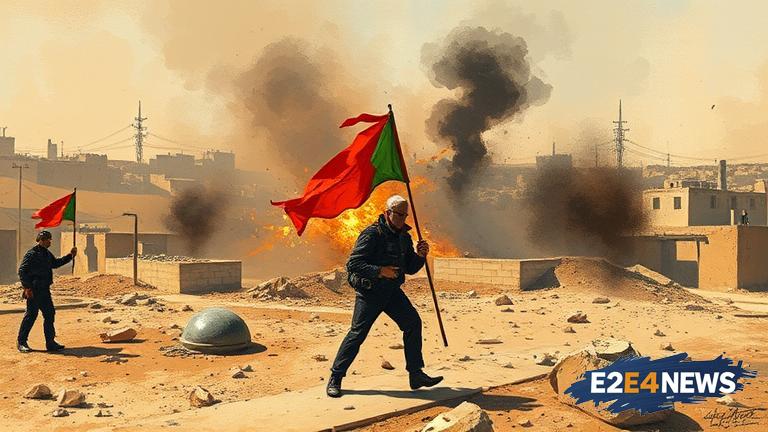The Israeli government’s ongoing expansion of settlements in the West Bank has been widely condemned by the international community, with many viewing it as a major obstacle to peace. The construction of new settlements and the expansion of existing ones has led to the displacement of Palestinian families and the destruction of their homes and livelihoods. Furthermore, the Israeli military’s use of force against Palestinian civilians has resulted in numerous injuries and fatalities, with many more being detained and imprisoned. The situation in Gaza is particularly dire, with the Israeli blockade having a devastating impact on the local economy and living standards. The lack of access to basic necessities such as food, water, and healthcare has led to a humanitarian crisis, with many Palestinians struggling to survive. The international community has called for an end to the blockade and the resumption of peace talks, but so far, there has been little progress. The Israeli government’s actions have been widely criticized, with many accusing it of violating international law and perpetuating human rights abuses. The Palestinian leadership has called for international intervention to protect Palestinian civilians and to hold Israel accountable for its actions. The United States, in particular, has been criticized for its support of Israel, with many arguing that it has emboldened the Israeli government to continue its aggressive policies. The European Union has also been urged to take a stronger stance against Israel’s actions, with many calling for economic sanctions and other measures to be imposed. Despite the challenges, many Palestinians remain committed to the pursuit of peace and self-determination, with many advocating for a two-state solution and an end to the occupation. However, the Israeli government’s actions have made it increasingly difficult to achieve a peaceful resolution, with many fearing that the situation will continue to deteriorate. The impact of Israel’s actions on Palestinian civilians cannot be overstated, with many facing daily struggles to access basic necessities and to live in safety. The psychological toll of living under occupation should also not be underestimated, with many Palestinians experiencing trauma and stress as a result of the ongoing violence and uncertainty. The international community has a responsibility to act to protect Palestinian civilians and to promote a peaceful resolution to the conflict. This can be achieved through a combination of diplomatic efforts, economic pressure, and support for Palestinian institutions and civil society. The Palestinian leadership must also be supported in its efforts to achieve statehood and self-determination, with the international community recognizing Palestine as a sovereign state. Ultimately, a lasting peace will only be achieved through a negotiated settlement that addresses the core issues of the conflict, including borders, settlements, and Jerusalem. The Israeli government must be held accountable for its actions, and the international community must take a stronger stance against its aggressive policies. The future of Palestinian sovereignty and the safety and well-being of Palestinian civilians depend on it. The situation is complex and multifaceted, with many different factors at play. However, one thing is clear: the Israeli government’s actions are having a devastating impact on Palestinian civilians, and the international community must act to stop it. The use of force and violence by the Israeli military is a major concern, with many Palestinians being injured or killed as a result. The detention and imprisonment of Palestinians is also a major issue, with many being held without charge or trial. The Israeli government’s actions are not only a violation of international law but also a threat to regional stability and security. The international community must take a stronger stance against Israel’s actions and support the Palestinian people in their pursuit of peace and self-determination. The United States, in particular, has a responsibility to act, given its close relationship with Israel and its influence in the region. The European Union and other international actors must also play a more active role in promoting a peaceful resolution to the conflict. The Palestinian leadership must be supported in its efforts to achieve statehood and self-determination, and the international community must recognize Palestine as a sovereign state. The Israeli government’s actions are a major obstacle to peace, and the international community must take a stronger stance against them. The situation in Gaza is particularly dire, with the Israeli blockade having a devastating impact on the local economy and living standards. The lack of access to basic necessities such as food, water, and healthcare has led to a humanitarian crisis, with many Palestinians struggling to survive. The international community must act to lift the blockade and to promote economic development in Gaza. The Palestinian people have the right to self-determination and statehood, and the international community must support them in their pursuit of these rights. The Israeli government’s actions are a threat to regional stability and security, and the international community must take a stronger stance against them. The use of force and violence by the Israeli military is a major concern, with many Palestinians being injured or killed as a result. The detention and imprisonment of Palestinians is also a major issue, with many being held without charge or trial. The Israeli government’s actions are not only a violation of international law but also a threat to the future of Palestinian sovereignty. The international community must act to protect Palestinian civilians and to promote a peaceful resolution to the conflict. The situation is complex and multifaceted, with many different factors at play. However, one thing is clear: the Israeli government’s actions are having a devastating impact on Palestinian civilians, and the international community must act to stop it.
